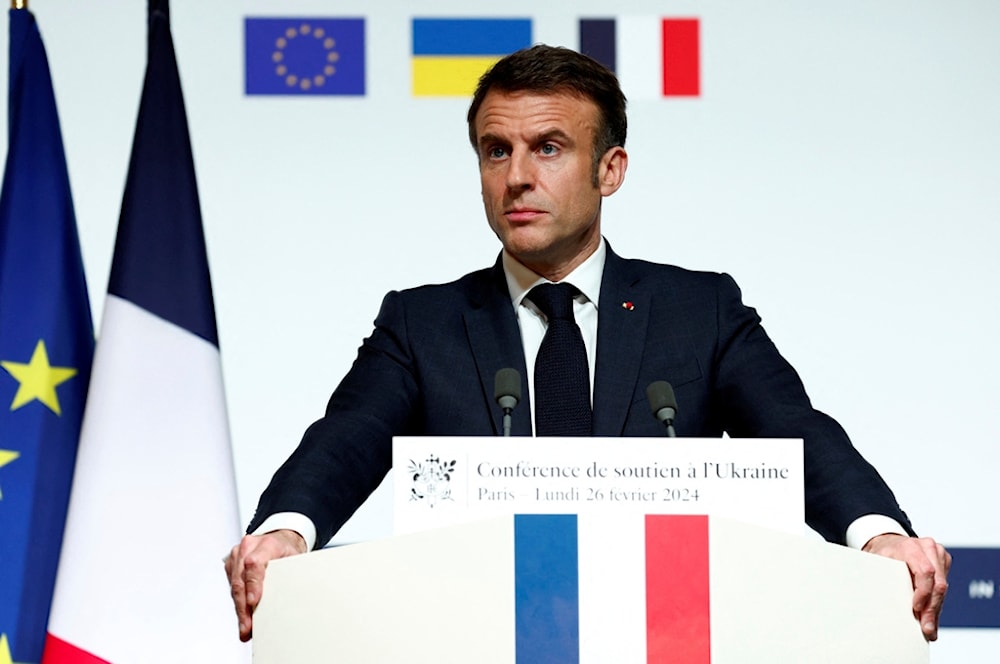Has Macron made a fool of himself at Western leaders' Ukraine meeting?
French President Macron sparked outrage among NATO members after announcing his decision not to rule out sending troops to Ukraine.
-

French President Emmanuel Macron speaks during a press conference at the Elysee Palace in Paris, Monday, Feb. 26, 2024(AP)
An analysis by Reuters on Tuesday detailed that French President Emmanuel Macron sparked confusion and irritation among allies on Monday by openly discussing the idea of sending Western troops to Ukraine.
"Nothing should be ruled out," he said. "We will do anything we can to prevent Russia from winning this war."
According to the analysis, Macron's statements, which were issued following a meeting of Western leaders to support Ukraine, challenged the prevailing view that such action would escalate tensions between NATO and Russia.
While his comments may pave the way for greater Western involvement in the Ukraine war, they also risk undermining unity among Western allies.
The White House and several European countries swiftly distanced themselves from the idea of sending troops to Ukraine, and the Kremlin warned of inevitable conflict if such a move were made.
#Opinion by MFA Spokeswoman Maria Zakharova:
— MFA Russia 🇷🇺 (@mfa_russia) February 27, 2024
💬 Regarding Emmanuel Macron’s statements on the possibility of sending NATO troops to Ukraine:
Emmanuel, are you planning to form Charlemagne Deux for the defence of Zelensky’s bunker?
🔗 https://t.co/L5f3RWVZre pic.twitter.com/CQEj4XVDoX
French officials clarified that Macron simply intended to spark debate and suggested non-combat roles for troops, such as demining or border protection.
"We must consider new actions to support Ukraine. These must respond to very specific needs, I am thinking in particular of mine clearance, cyberdefence, the production of weapons on site, on Ukrainian territory," French Foreign Minister Stephane Sejourne told lawmakers.
Macron's remarks also raised tensions with Germany and prompted debate among NATO members.
Read more: Scholz fears complicity if Germany supplies Kiev with Taurus missiles
One EU source told Reuters that Macron’s comments were "a cacophony between allies, at the expense of credibility".
Another French source told Reuters that if the West stayed on its current course of merely donating arms and aid, "we will comfort President Putin in his impression that we are weak".
"In reality, we're taking a big risk with that game for all of us in Europe, which is to see Russia win."
Some converge, some diverge
Despite the controversy, some Eastern European officials saw value in the discussion, emphasizing the urgency of Ukraine's situation.
"Times like these require political leadership, ambition, and courage to think out of the box. The initiative behind the Paris meeting yesterday is well worth considering," said Lithuanian Foreign Minister Gabrielius Landsbergis.
Others expressed otherwise. "Hungary does not even want to send weapons to Ukraine, let alone soldiers," said Peter Szijjarto, Hungary's Foreign Minister.
General Onno Eichelsheim, the Chief of Defence of the Netherlands, stated that it is currently "not yet opportune" for the Netherlands to discuss sending soldiers to Ukraine.
However, he noted: "I think you should keep all options open to see how you can best support Ukraine."
Options remain on the table, including the possibility of increased weapon support for Ukraine, as its need for munitions becomes increasingly critical for its conflict with Russia.

 3 Min Read
3 Min Read











